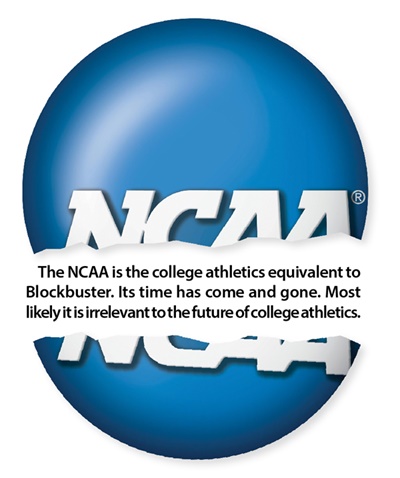There comes a point in every young person’s life when they realize that adults aren’t infallible and at times do harmful or stupid things. The U.S. collegiate athletics system in the pro sports of football and men’s basketball is currently doing harm to young people, harm that disproportionately affects black males. Unfortunately, by the time these student athletes realize that they have been harmed, they have lost an opportunity at one of the great economic equalizers in American society: an education. Although this article focuses on the sellout of college administrators and educators to the athletic dollar, adults are behaving badly at every stage of the U.S. education system once a student is placed on the athlete track.
One historical fact of U.S. immigrant families during the first half of the 20th century is that a college sports scholarship was the ticket to the American dream. This dream wasn’t to play professional sports. Rather it was to break into the post-secondary U.S. education system and have a shot at a better-paying job or career. In other words, the purpose of the athletic scholarship was for access to a college education.
Fast forward to today where basketball players are idolized with one-and-done collegiate careers and football players weigh leaving school after three years to begin a pro career. Where are the scared-straight — to homework — ESPN or Nike public service announcements urging black male athletes to stay in school? Better yet, let each university’s game-day PR commercials feature a realistic view of the jobs and lives of their star but non-pro-career black football and basketball players five years after leaving their institutions.
It’s common knowledge for anyone who dares to accept the facts that many colleges admit more than a handful of football and men’s basketball players each year who do not meet the academic standards of admission for the general student population. Even worse, many of these student athletes read at below high school level. So which college courses and majors are being offered that require less than a ninth-grade reading level? And since when did the NCAA eligibility standards become the educational standard for universities across America?
 |
The NCAA should forget worrying about paying college athletes or publishing graduation statistics (which by the way ignore those who leave in good standing but without a degree). The NCAA instead should start providing the job, salary and unemployment statistics by ethnicity for every football and men’s basketball student athlete. And it should limit these statistics to those who did not play professionally five years after they maintained their eligibility through satisfying the “rigorous” NCAA academic eligibility standards.
For the record, standards slip incrementally. Similar to aging, you don’t recognize small weekly changes in appearance but a 10-year-old driver’s license picture can be almost unrecognizable. This is what has happened to standards relating to collegiate athletics — they are unrecognizable to a previous generation. Thus, incremental improvements will not address core problems surrounding the student athlete. It also may be likely that the current stakeholders will not have the will or vision to make the necessary changes. This lack of vision is routine in business where Blockbuster gives way to Netflix, rarely a reformatted Blockbuster.
Nevertheless, here are potential paths that current stakeholders in the success of the men’s basketball or football student athlete might consider to once again put the interests of these individuals first.
NBA: Recognize that all athletes don’t need to enter college. With its one-and-done fiasco, the NBA already recognizes that its future players don’t need to go to class, let alone graduate. Address this by adopting the baseball model; either enter an NBA draft out of high school or wait three years. The NBA can work to develop the high school draftee as a complete individual — life skills and education plus a developmental league for three years. Provide a Veterans Administration-type education benefit for “developmental player graduates” who don’t make it to the next level.
Conferences: Either at the conference commissioner level or at the school level when there are a minimum of four brave conference schools, return football to Saturday and basketball to a weekend schedule similar to the Ivy League or the Pac-8 before the Pacific Ocean extended to Colorado.
NCAA: The college athletics equivalent to Blockbuster. Its time has come and gone. Most likely it is irrelevant to the future of college athletics.
So the simple question is: Where are the adults at our colleges and universities? Where are the adults to say no to football games on a day other than Saturday? Where are the adults to say no to athletic conferences that crisscross the country? Or adults to say no to a 35-plus-game college basketball season with excessive travel and missed class time?
I’ll grant that college coaches are just doing their jobs by recruiting these “student athletes.” But university presidents, trustees and athletic directors are failing at their job of upholding the educational and ethical standards of their universities. How many generations of black males must be lost while these adults endorse the charade? The next generation awaits your leadership.
Jim Tucker (jim.tucker@tuckerbria.com), a CERTIFIED FINANCIAL PLANNER™ professional, has been a featured speaker at pre-draft athletic all-star games and is an NFLPA registered player financial advisor.





